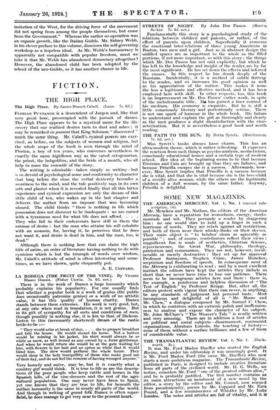Fundamentally this story is a psychological study of the relations
between children and parents, or rather, of the effect of parents upon children. Superficially it concerns, the emotional inter-relations of three young Americans in Boston, two men and a girl. Just as in abstract design the unfilled spaces are as important to the whole as the filled portions, if not more important, so with this story ; the things which Mr. Dos Passos has not said explicitly, but which he has left to the knowledge and insight of the reader, are by far the most significant. He has set down the effects and inferred the causes. In this respect he has drunk deeply of the Russians. Incidentally, it is a method of subtle flatterF to the reader, and so increases his good opinion as well as his appreciation of the author. This makes it none the less a legitimate and effective method, and it has been employed here with skill. In other respects, too, this book is an improvement on Mr. Dos Passos' earlier work, in spite of the melodramatic title. He has gained a finer control of his medium. His economy is exquisite. But lie is still a little consciously literary and portentously serious. There is not one spark of humour in the whole book. His failure to understand and explain the girl as thoroughly and clearly as the men produces a slight dissatisfaction with the char- acterization. But it is nevertheless a good book and worth reading.


































 Previous page
Previous page